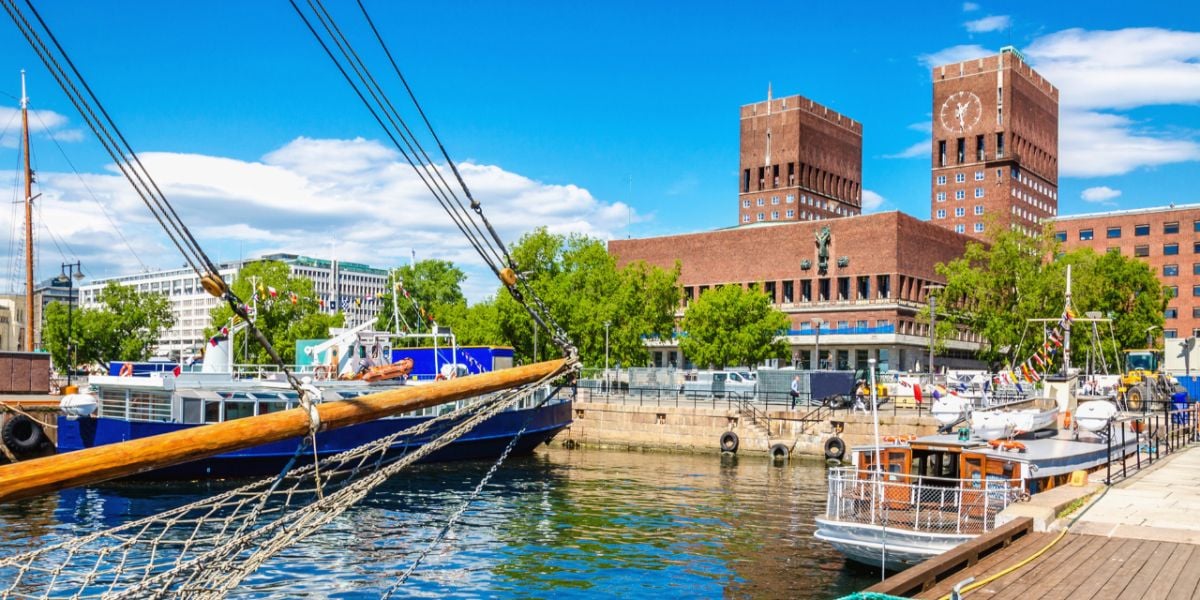
An average of 60,000 new businesses are established annually in Norway—an unsurprising statistic given the country's economic stability, high quality of life, and innovation-friendly environment. If you're considering the alluring prospect of launching your own business in Norway, here's everything you need to know to fulfill the several steps and conditions required and turn your entrepreneurial vision into reality.
Why choose Norway? The benefits of starting a business in a thriving nation
Norway consistently ranks among the best countries for doing business. According to the World Bank's 2020 report, it is the 9th easiest place to establish and run a business globally.
Key advantages that appeal to entrepreneurs are the following:
- Economic stability: Norway boasts one of the world's most stable economies, supported by natural resources like oil and gas, as well as diversified investments in technology, renewable energy, and services.
- High quality of life: Exceptional living standards, access to quality public services, strong social protection, and a focus on work-life balance make Norway an attractive destination for entrepreneurs seeking a healthy and secure environment.
- Thriving startup ecosystem: Norway actively fosters innovation, with support for startups through incubators, government initiatives, and a strong focus on green technologies, fintech, and biotech.
Promising sectors for business in Norway
Norway's economic landscape offers diverse opportunities across various sectors, with particular emphasis on sustainability and innovation through renewable energy and green transitions. Key sectors include:
- Green technologies (CleanTech): As a leader in sustainability, Norway supports businesses in renewable energy, recycling, and clean technology.
- Fintech: Rapid growth and change in Norway's financial sector create high demand for digital payment solutions, blockchain, and decentralized financial services.
- Biotechnology: Investments in life sciences and medical technologies present unique opportunities in pharmaceuticals, diagnostics, and medical innovation.
- Tourism: Norway's natural beauty fuels growth in eco-tourism, luxury services, and outdoor activities.
- Fishing and aquaculture: As a global leader in seafood exports, Norway offers potential for sustainable aquaculture, fishing technology, and seafood processing businesses.
Despite these opportunities, a labor shortage exceeding 70,000 workers – particularly in healthcare, engineering, and manufacturing – can pose challenges to scaling businesses.
Business structures for foreign entrepreneurs in Norway
Foreigners can choose from several business structures to establish in Norway:
- Sole proprietorship (Enkelt Person Foretak): Ideal for freelancers and small businesses. No minimum capital is required, but the owner assumes full liability.
- Limited liability company (Aksjeselskap or AS): A popular option requiring a minimum share capital of 30,000 NOK. Shareholders' liability is limited to their investments. This structure is recommended for larger-scale projects.
- Branch office of a foreign company (Norsk Registrert Utenlandsk Foretak or NUF): suitable for existing foreign businesses seeking a local presence without creating a separate legal entity.
- Cooperative (Samvirke Foretak or SA): Less common but best for social or collective ventures, where members share profits and responsibilities.
Eligibility and requirements
If you are not a Norwegian citizen, here's what you need to know with regard to key eligibility criteria to set up a business in Norway:
- EU/EEA citizens do not need a residence permit to start a business. Non-EU citizens must apply for a specific entrepreneur visa.
- Your business must have a registered address in Norway (office, residence, or virtual).
- Obtain a D-number (temporary) or F-number (permanent) at the Norwegian Tax Administration.
- A minimum deposit of 30,000 NOK is required for limited liability companies (AS) and can be used as the business' initial investments.
- You must register your company with the Brønnøysund (Norway's Register of Business Enterprises), including filing company articles, name of company and shareholder information.
Who needs a visa to start a business in Norway?
Non-European Union (EU) entrepreneurs planning to settle in Norway must obtain a specific residence permit based on the type of business activity they intend to pursue.
Residence permit for self-employed individuals
This permit is designed for entrepreneurs looking to start or acquire a business in Norway. To qualify, applicants must provide a comprehensive business plan, proof of sufficient financial resources to support themselves, and compliance with all legal requirements related to the intended professional activity.
General procedure for non-EU entrepreneurs applying for a business visa in Norway
To secure the appropriate residence permit for starting a business, follow these steps:
- Submit your application online: Most applications are processed through the Norwegian Directorate of Immigration (UDI) portal.
- Submit the required documents: These typically include a valid passport, a detailed business plan, proof of financial means, documentation of professional qualifications, etc.
Processing times vary depending on the type of permit and the complexity of the application.
Steps to starting a business in Norway
Choose your business structure
The first step is to select the legal entity that best suits your business model based on your needs and project size and goals. Once this is settled, you can follow up with registering.
To register your business in Norway, follow these steps:
- Verify the availability of your unique business name through the Norwegian Business Register.
- Make the required share capital deposit if going for a limited liability company (AS) into a Norwegian bank account under your company's name.
- Visit the official administrative online platform of Altinn to submit necessary documents like registration forms, articles of incorporation, share capital and shareholder details.
- Upon registration, obtain your unique organization number, mandatory for banking, invoicing, and tax purposes.
Tax registration
Register with Norwegian tax authorities to get a VAT number if your annual turnover exceeds 50,000 NOK. You are required to report your income and comply with tax obligations in Norway.
Insurance and social security
As an entrepreneur in Norway, you should ensure compliance with Norwegian insurance and social security regulations, including coverage for employees and yourself for health, accidents and invalidity.
Complying with standards and regulations
Depending on your industry, you may need to adhere to specific health, safety, and environmental standards. It is essential to consult with local authorities to ensure your business complies with all applicable regulations. For matters related to business practices and advertising, contact Forbrukertilsynet, the Norwegian Consumer Authority. For issues involving technical compliance and workplace safety, the Norwegian Labour Inspection Authority oversees adherence to health and safety standards in the workplace.
Startups in Norway
Norway's dynamic ecosystem is designed to foster entrepreneurship as an attractive, emerging hub for startups.
Incubators and accelerators for Scandinavians
Norway has numerous incubators and accelerators that support startups during their early years of growth. Its most popular structures include:
- StartupLa, which offers coworking spaces, mentorship, and funding opportunities for tech startups in Oslo.
- Katapult Accelerator, which focuses on social and environmental impact startups, providing support for rapid implementation of initial concepts through mentorship, resources and, sometimes, seed investments.
Financing and investments
Various funding sources are made available to startups in Norway, ranging from government subsidies and low-interest loans to risk capital. Grants from Innovation Norway, the government agency supporting innovation, offers a wealth of information, grants and support to startups. Investment funds can additionally be sought from Norway's network of business angels and investors that prioritize startups.
Networking events
Networking is an indispensable element of the Norwegian startup ecosystem. As such, the country regularly hosts a variety of events dedicated to entrepreneurs, ranging from hackathons to international innovation conferences. Highlight events include the annual Oslo Innovation Week, a major event connecting startups, investors, and tech leaders worldwide to discuss the sector's new trends, challenges and opportunities. This is the ideal platform for startup entrepreneurs to link up with potential investors and collaborate with fellow innovators.
Additionally, organizations like Startup Norway and Technoport regularly host workshops, seminars and pitch events for entrepreneurs to present their ideas, obtain feedback and link up with other market players.
Government support
The Norwegian government, through Innovation Norway, offers robust support for startups by providing grants, low-interest loans, and tailored advisory services for innovative businesses. Programs such as Grants for Environmentally Friendly Technology are designed to encourage the development of sustainable solutions. Additionally, Norway's tax incentives for companies investing in research and development make the country especially appealing to tech-driven enterprises, fostering a vibrant ecosystem for innovation and growth.
Local support
For businesses based in Oslo, additional municipal support is available, particularly in the fields of climate action and sustainability. The city offers subsidies for installing electric vehicle charging stations, including those for taxi fleets, and provides financial assistance for energy-efficient building renovations.
Starting up a business in Norway: Challenges to consider
While Norway offers a supportive environment for startups, it is important to consider some potential challenges.
High cost of living and salaries
Norway's cost of living ranks among Europe's highest and consequently, the high salaries can strain startup budgets, especially when it comes to hiring qualified labor. Careful financial planning is thus essential to cover these important costs.
Language barrier
While English is widely spoken, proficiency in Norwegian is often necessary for business integration, customer interaction and navigating legal processes. This can prove challenging to some foreigners, particularly in the early stages of business setup.
Competition and market size
With a population of only 5 million, scaling beyond Norway may require early plans for regional or international expansion to get around the local market. This is also a key element to consider in highly competitive sectors where local market players are often well-established.
We do our best to provide accurate and up to date information. However, if you have noticed any inaccuracies in this article, please let us know in the comments section below.








